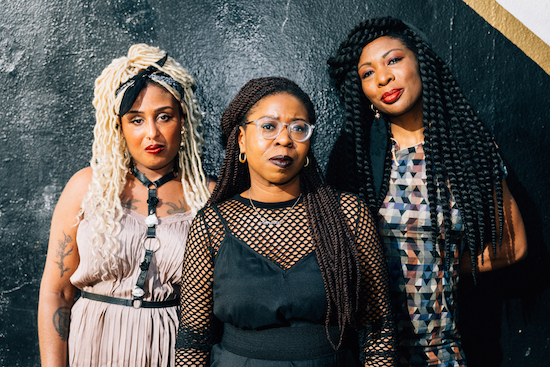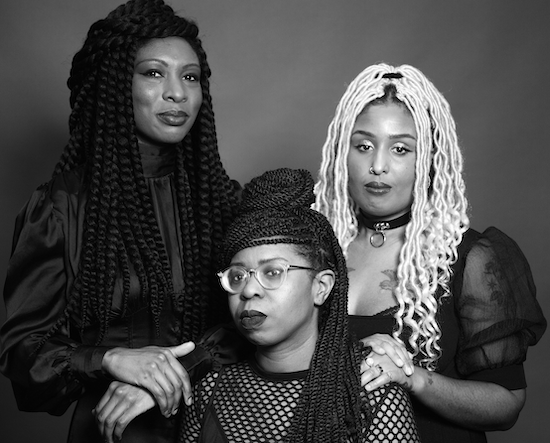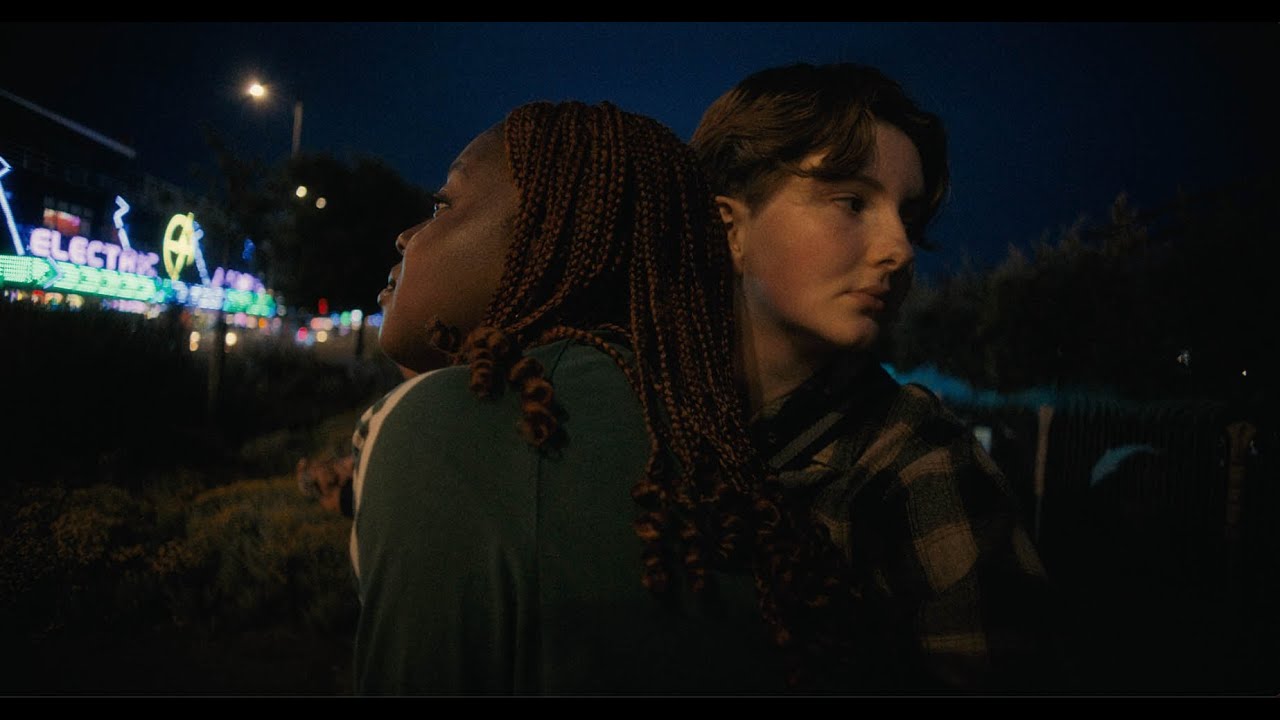Photo by Ajamu X
Big Joanie are an esteemed punk trio, praised for their distinguished sound, unapologetic political outlook and vigorous work on projects outside of this outfit. Consisting of frontwoman Stephanie Phillips, bassist Estella Adeyeri and drummer Chardine Taylor-Stone, this month saw them share their highly anticipated second album Back Home. A genre-fluid project consistent in its punk ethos whilst also incorporating vivid indie and electronica, Back Home sees the band both re-defining their sound and solidifying the punk roots that were always at the foundation of their work.
After their album Sistahs back in 2018, the band quickly made it clear that they were an emerging outfit to watch. In my 2019 interview with Big Joanie we discussed the path the band were taking as a Black feminist trio making an unapologetic amount of noise in the punk scene. Since then, they have featured on huge festival bills such as Glastonbury, Grace Jones’ Meltdown Festival, opened for St. Vincent on her UK tour, supported Skunk Anansie and are soon to support Courtney Barnett.
Three years on, I’m speaking with the band again in the lead up to their second studio album, Back Home, was recorded in North London’s Hermitage Works Studios. Drawing influence from a number of sources, throughout the album the band also welcome beautiful string work from esteemed violinist Charlotte Valentine and sees frontwoman Phillips incorporate the omnichord (an instrument she picked up inspired by Sharon Van Etten’s album Are We There).
Back Home is not only a moment of new beginnings, but a sentiment of true growth for the band. This is Big Joanie at their strongest. “When we went through the lyrics the theme of home seemed to stand out in different ways,” says Taylor-Stone as we unravel the process. It’s easy to spot this theme of ‘home’ across the album in several ways. “Whether it be the meaning of a physical home, in the sense of the housing crisis, or in terms of how we all fit into society, home is referenced. ‘We’re all children of migrants and we have a home, we were all born here, and technically this country is our home, but for our families it’s somewhere else. Although visited briefly, it doesn’t quite feel like home yet. It’s all about trying to find a home within these different spheres,” she says.
The band brought back friend and regular producer Margo Broom for the recording of Back Home. “I think having worked with Margo on the first album we felt really comfortable going back in the studio with her” says Adeyeri. “We were able to be a bit more adventurous in comparison to how we did with Sistahs. We have a better idea of what we’re capable of doing in the studio now too. It’s really been a positive working relationship; she pushes us to go that extra mile.”
Having expanded their knowledge on the depths of the studio and pushed themselves (with the help of Margo), they have in the process created a cohesive and mature project that sees them return incredibly polished. “This album compared to Sistahs, which was our first time in the studio, saw us use the studio in a different way. I guess as its own instrument,” says Taylor-Stone. “We saw this album as its own piece of work, as opposed to an extension of a live performance. I also definitely got more into the production side. I’ve been into music and collecting vinyl for such a long time, learning how some of those artists made those records and then being able to bring that knowledge into the studio with Big Joanie has been a great coming together. I wasn’t able to do that before as I didn’t really understand the studio in itself. It’s really something to be able to bring two sets of knowledge and be able to expand everything and not be set in any one mould. It has been a really good experience. Especially since artists we all like such as Sleater-Kinney or PJ Harvey, none of their albums are the same, there’s nothing more boring than a band doing the same thing every album – no one wants to do that! I think it’s important to grow musically, whilst having a core sense of self.”
Inspired by some of the most influential pioneers of the punk scene, Big Joanie are adamant to show their fans that no song, nor album they release is going to sound the same. Their punk sound is at their core, and comes into play their moral compass, but by no means does this label define their forever evolving sound. Being long-time fans of Sleater Kinney since they were young, the band touch upon their recent collaboration with them for their 25th anniversary Dig Me In: A Dig Me Out covers Album, which simultaneously saw covers from Courtney Barnett, St Vincent, Self Esteem, and several others. “It was really amazing, we’ve been fans of Sleater-Kinney since we were teenagers, they’re probably one of my biggest influences,” says Phillips. “It was amazing when we got to support them at Brixton, so it was great that they asked us, especially because Dig Me Out is one of my favourite albums. We had a really good time working on the song, it was interesting to do, we pulled it a part and found a way to make it a bit moodier.”
“Yeah, I think Chardine had the idea to slow it down, and we pitched the vocals an octave lower,” Adeyeri adds (a quintessential Big Joanie trademark might I add). Chardine adapts on this, having spent closer time on the lyrics and how the band could turn it into a Big Joanie special. “I tend to think visually in terms of the sounds we’re making in the studio, and I’ll use that as a reference because I don’t know keys – to me it’s all about atmosphere. In my head the cover was a Tarantino-esque vibe, maybe a couple’s arguing in a car, and one gets murdered. That was the vibe we were going for, I’d definitely love to make a film track one day, that’s another ambition for Big Joanie, you know, if Jordan Peele is reading The Quietus right now… we’re here, we’re ready to work.”

Photo by Sam Keeler
Debuting their punk ethos with Sistahs, Big Joanie have since been on an ascending journey within the industry. And when you listen to Back Home, you can hear the shift they’ve made, not only in their change in sound, but just how solidified their message is. Despite not fitting into the generic, commercialised ideology of what punk is supposed to mean, Big Joanie are still very much a punk band, it’s in their ethics, it’s in their sound, it’s in their aesthetic. “I think punk has become such a cliché, but if you listen to it, it’s actually very diverse,” Taylor-Stone says. The band converse about their staple punk sound and how, whilst this album sees them explore new sounds, punk is still the face of their work. “You have Siouxsie Sioux, James Chance had a saxophone, X-Ray Spex sounded nothing like The Slits – you know, there was no fixed sound,” she continues. “There was a scope for difference, I think now it’s become ‘you play three chords, and you shout’ but I’ve always seen punk as about the approach you have. It’s very much our attitude, and how we approach it in a punk frame from who we choose to work with, to how we work with people, etc. All those choices are probably never going to change.”
Adding to this, Phillips says: “We’re from the punk of it being ‘DIY’ so I think it’s important go where the song needs to take you, rather than direct it. It wouldn’t make sense for us to mould it into whatever other people think punk is or shape it a certain way. We just need to make sure it becomes what it needs to be, and if it doesn’t sound punk to someone else that doesn’t really matter, because it’s still made in the punk ethos that we know it to be.”
And this is one of the many reasons Big Joanie have been able to achieve the success they have. Their sound is completely authentic, it bears witness to no one, standing on its own two feet. Back Home is “a record of ambition,” as Taylor-Stone says. “After touring with the bigger bands and being able to think on that scale, we had to think to ourselves, ‘what do we need to do to get ourselves at the stage of headlining those types of shows instead of being support.’ It’s almost a physical album in that sense, it’s all about being able to make a bigger sound, expanding on ideas on what can be put into the music and not being afraid to do so. If anything, yes, we come from a DIY feminist scene, but we’re not locked into the boarders that people create around those scenes and those genres.”
Back Home isn’t only about Big Joanie developing their sound, as Adeyeri recounts: “The hope with this album is to tour other territories we haven’t had the chance to play yet, that’s something that’s definitely been in discussion.
Big Joanie may be your favourite Black feminist punk band but are by no means restricted by this. Their sound is more varied than it’s ever been, and their acclaim is rapidly growing by the second. “There’s so many amazing POC led bands now, and people can’t just dismiss us as being a blip, or a token,” Taylor-Stone says. “We are a part of the musical landscape of this country and the alternative music world. We’re Black, in a very White industry, but we’re also a band, we’re not some spectacle that people want to put on TikTok. It’s about respecting the music we choose to make first and foremost, and they’re going to have to accept that its Black women making this music.”
Big Joanie’s new album Back Home is out now via Daydream Library Series and Kill Rock Stars.



